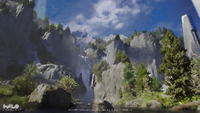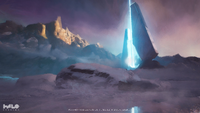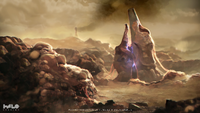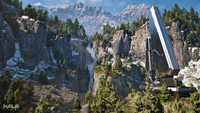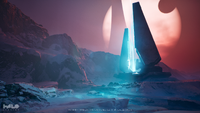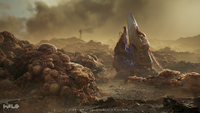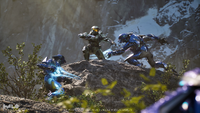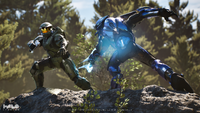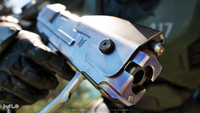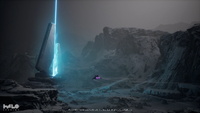Project Foundry: Difference between revisions
From Halopedia, the Halo wiki
Tag: Mobile edit |
Tag: Mobile edit |
||
| Line 4: | Line 4: | ||
==Overview== | ==Overview== | ||
Project | Project Foundry was created as part of 343 Industries' transition into Halo Studios, under the direction of the new studio leadership led by [[Pierre Hintze]]. As part of this vision, Hintze explained that while making ''[[Halo Infinite]]'', 343 Industries had been attempting to be both a game developer ''and'' a software company at the same time by attempting to build and maintain the Slipspace Engine while developing ''Halo Infinite''. This led to [[Development of Halo Infinite|difficulties in production]] due to the studio's divided attention; something that Halo Studios aims to solve by switching to an engine developed by another studio—allowing them to refocus entirely on game production. As such, all future ''Halo'' games will use Unreal 5.{{Ref/Reuse|WP}}{{Ref/Reuse|Wire}} The demo began as an internal development project that rapidly evolved into being a larger graphics showcase for the studio's Unreal Engine announcement.{{Ref/Site|Id=ArtStation|URL=https://www.artstation.com/artwork/AZom05|Site=ArtStation|Page=Project Foundry - Lighting|D=07|M=11|Y=2024|Quote=Project Foundry was a very interesting internal development project that quickly evolved into a graphics showcase for the studio's announcement that we are moving to Unreal 5. I worked on the Blightlands biome and was responsible for the lighting, sky and clouds, some of the fog, and a bit of world building too. I learned a lot during this project and am proud of what the team has produced. Art Direction from Chris Matthews, Glenn Israel, and Donnie Taylor. World Building and Assets from John Flath and Jessi Ruselowski, Materials and Surfacing from Chiyo Lai and Brittany Drew. Technical Art from Logan McClure and Andrea Gausmann. Plus many other contributions from the rest of the foundry team!|Quotee=Aaron Hofsass}} | ||
The demo has three environments; a classic, Pacific Northwest-styled environment inspired by preexisting ''Halo'' levels such as the [[Halo (Halo: Combat Evolved level)|eponymous mission]] from ''[[Halo: Combat Evolved]]'', the Coldlands, a winter biome with a star visible behind the ring, and the [[Blightlands]]—a [[Flood]]-infested environment.{{Ref/Reuse|WP}}{{Ref/Reuse|Wire}} All three reuse some ''Halo Infinite'' assets such as the [[Forerunner]] [[beacon tower]]s, with the Coldlands environment featuring a [[Banshee]] that flies through the sky. The classic environment is used for a handful of dioramas; the first depicting the [[John-117|Master Chief]] clad in ''Halo Infinite's'' rendition of the [[MJOLNIR Powered Assault Armor/Mark V|MJOLNIR Mark V]] armor while wielding an [[M6D magnum]], fighting a pair of [[Sangheili Mercenary|Sangheili Mercenaries]] equipped with {{Pattern|Meluth'qelos|energy sword}}s, while the latter depicts only the Master Chief equipped with the same energy sword. | The demo has three environments; a classic, Pacific Northwest-styled environment inspired by preexisting ''Halo'' levels such as the [[Halo (Halo: Combat Evolved level)|eponymous mission]] from ''[[Halo: Combat Evolved]]'', the Coldlands, a winter biome with a star visible behind the ring, and the [[Blightlands]]—a [[Flood]]-infested environment.{{Ref/Reuse|WP}}{{Ref/Reuse|Wire}} All three reuse some ''Halo Infinite'' assets such as the [[Forerunner]] [[beacon tower]]s, with the Coldlands environment featuring a [[Banshee]] that flies through the sky. The classic environment is used for a handful of dioramas; the first depicting the [[John-117|Master Chief]] clad in ''Halo Infinite's'' rendition of the [[MJOLNIR Powered Assault Armor/Mark V|MJOLNIR Mark V]] armor while wielding an [[M6D magnum]], fighting a pair of [[Sangheili Mercenary|Sangheili Mercenaries]] equipped with {{Pattern|Meluth'qelos|energy sword}}s, while the latter depicts only the Master Chief equipped with the same energy sword. | ||
Latest revision as of 14:58, December 28, 2024
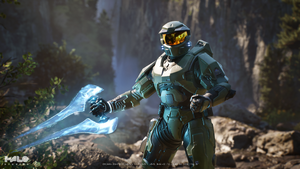
Project Foundry is a real-time project created by the Halo Studios development team as part of the studio's transition from the old Blam/Slipspace Engine to Unreal Engine for game development. It was formally announced on the final day of the Halo World Championship 2024 event, alongside the rebranding of 343 Industries to Halo Studios. The project is a collection of three real-time environments created in Unreal Engine 5, designed to explore what would be needed to transition the studio and its development pipelines into using Unreal, and what kind of challenges might faced while doing it. When announced, Halo Studios noted that Foundry is not a game, nor is it a testbed for one, instead emphasizing the exploratory nature of the development process.[1][2]
Overview[edit]
Project Foundry was created as part of 343 Industries' transition into Halo Studios, under the direction of the new studio leadership led by Pierre Hintze. As part of this vision, Hintze explained that while making Halo Infinite, 343 Industries had been attempting to be both a game developer and a software company at the same time by attempting to build and maintain the Slipspace Engine while developing Halo Infinite. This led to difficulties in production due to the studio's divided attention; something that Halo Studios aims to solve by switching to an engine developed by another studio—allowing them to refocus entirely on game production. As such, all future Halo games will use Unreal 5.[1][2] The demo began as an internal development project that rapidly evolved into being a larger graphics showcase for the studio's Unreal Engine announcement.[3]
The demo has three environments; a classic, Pacific Northwest-styled environment inspired by preexisting Halo levels such as the eponymous mission from Halo: Combat Evolved, the Coldlands, a winter biome with a star visible behind the ring, and the Blightlands—a Flood-infested environment.[1][2] All three reuse some Halo Infinite assets such as the Forerunner beacon towers, with the Coldlands environment featuring a Banshee that flies through the sky. The classic environment is used for a handful of dioramas; the first depicting the Master Chief clad in Halo Infinite's rendition of the MJOLNIR Mark V armor while wielding an M6D magnum, fighting a pair of Sangheili Mercenaries equipped with Meluth'qelos-pattern energy swords, while the latter depicts only the Master Chief equipped with the same energy sword.
The demo was unveiled with a trailer, titled A New Dawn, featuring interviews with several developers involved in the project and featuring a look at some of the animations and moving effects including waterfalls, weather, and Flood spores.[4]
Staff involved in the creation of Project Foundry include (though are not limited to):
- Art Direction
- Chris Matthews[3]
- Glenn Israel[3]
- Donnie Taylor[3]
- 3D Assets and Worldbuilding
- Materials and Surfacing
- Technical Art
- Lighting
- Aaron Hofsass[3]
Trivia[edit]
The project's name is a direct reference to the Foundry, the location at Installation 00 where the rings of the Halo Array are manufactured.
Gallery[edit]
Concept art[edit]
Screenshots[edit]
Sources[edit]
- ^ a b c Halo Waypoint, A New Dawn (Retrieved on Oct 7, 2024) [archive]
- ^ a b c Xbox Wire, Halo Studios: New Name, New Engine, New Games, New Philosophy (Retrieved on Oct 7, 2024) [archive]
- ^ a b c d e f g h i j k ArtStation, Project Foundry - Lighting: "Project Foundry was a very interesting internal development project that quickly evolved into a graphics showcase for the studio's announcement that we are moving to Unreal 5. I worked on the Blightlands biome and was responsible for the lighting, sky and clouds, some of the fog, and a bit of world building too. I learned a lot during this project and am proud of what the team has produced. Art Direction from Chris Matthews, Glenn Israel, and Donnie Taylor. World Building and Assets from John Flath and Jessi Ruselowski, Materials and Surfacing from Chiyo Lai and Brittany Drew. Technical Art from Logan McClure and Andrea Gausmann. Plus many other contributions from the rest of the foundry team!" - Aaron Hofsass (Retrieved on Nov 7, 2024) [archive]
- ^ YouTube - HALO, A New Dawn | Halo Studios (Retrieved on Oct 7, 2024)
| ||||||||||||||||||||||||||||||||||||||||||||
